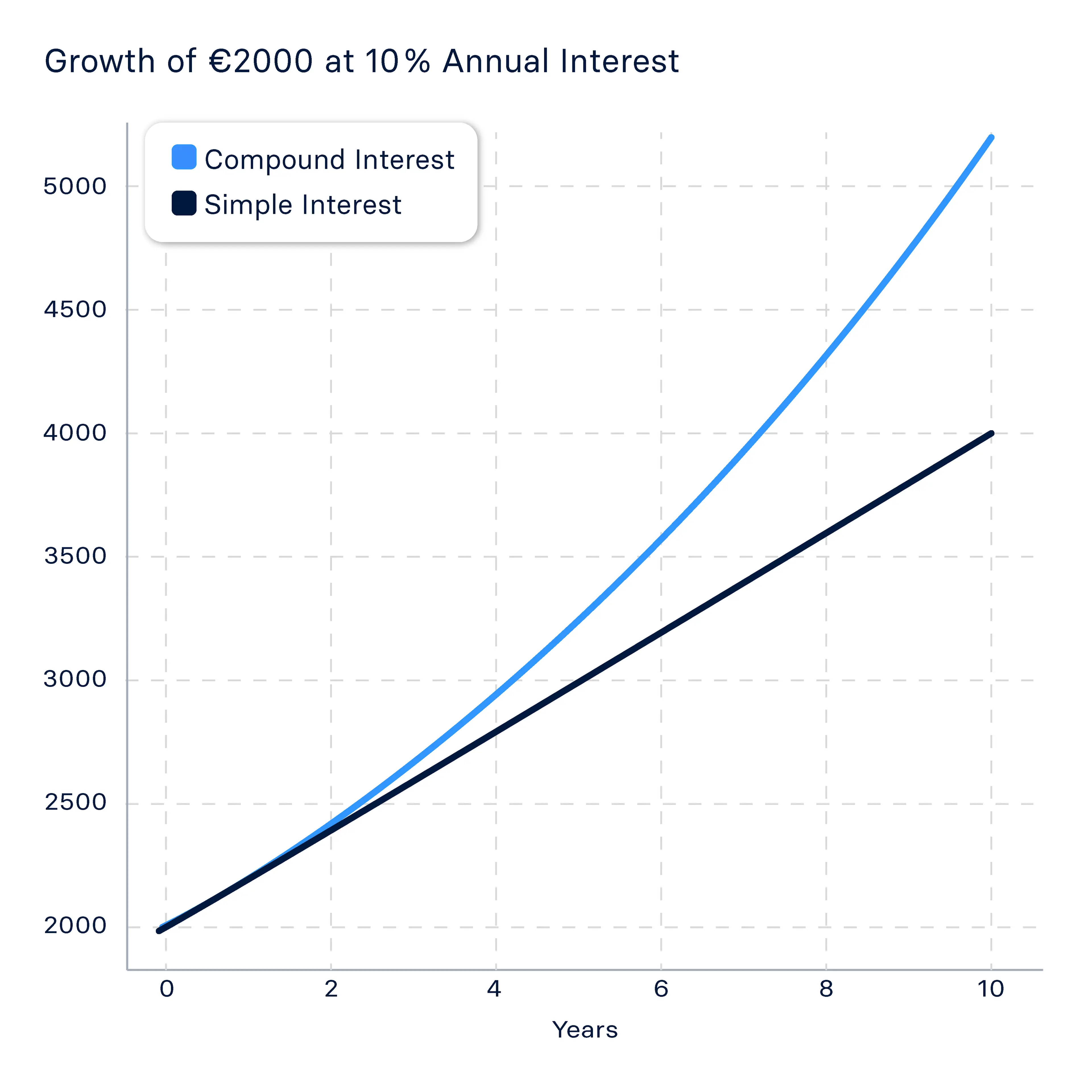Compound interest in Ireland explained
A simple guide to how compound interest works

If you want your savings to grow effectively, it helps to understand compound interest. This is where you earn interest not just on your original deposit, but also on the interest already accumulated. This page explains what compound interest means for savers in Ireland, how it works, and why starting early can increase its effect over time.
Key takeaways
Compound interest is interest accumulated on the , and on the
With compound interest savings accounts, your savings have the potential to grow more efficiently over time by building interest on previous interest
The compounding period describes how often , and it can affect how much you earn
The information provided here is for informational and educational purposes only and does not constitute financial advice. Please consult with a licensed financial adviser or professional before making any financial decisions. Your financial situation is unique, and the information provided may not be suitable for your specific circumstances. We are not liable for any financial decisions or actions you take based on this information.
What is compound interest?
Compound interest is the interest you earn from your original deposit combined with the interest you’ve earned so far. If you make deposits into a compound interest savings account where interest is paid annually, you’ll keep earning interest on each previous year’s interest. This means that if the rate of interest stays the same, you’ll earn more from your savings every year your interest compounds. The ‘interest on interest’ effect contrasts with simple interest, which is only calculated on your original deposit.
Compound interest is also a feature of some pensions and long-term investments, because investments can grow faster the longer they’re left untouched. However, it’s not always possible to calculate compound interest on investments in Ireland, as returns are not fixed or even guaranteed.
When it comes to borrowing (for example, on credit cards), compound interest can work against you, as interest may be charged on unpaid interest. In these cases, the cost is usually shown as the Annual Percentage Rate (APR).
How do you calculate compound interest in Ireland?
The formula for calculating compound interest might look complicated, but it can help to break it down.
The compound interest formula is A = P(1 + R/N)^NT, where:
A is the total Amount you’ll earn at the end of your term
P is the Principal, or the amount of your initial deposit
R is the annual interest Rate you’ll earn (expressed as a decimal)
N is the Number of times your interest will compound per year
T is the Time in number of years you expect to save for
There are several compound interest calculators available online in Ireland, which can make it easier to work out how much you might earn. Alternatively, see the simplified example calculation below.

How does compound interest work?
Here’s a simplified example of how compound interest works:
If you deposit €2,000 into a savings account that offers a fixed interest rate of 10% and pays interest annually, you’ll earn €200 in interest on the first anniversary of opening your savings account, giving you a balance of €2,200.
If you don’t make any deposits or withdrawals during the second year, you’ll earn another 10% in interest, but this time, it will be on an account balance of €2,200. 10% of €2,200 is €220, so that means you’ll earn €220 in interest, and your balance at the end of year two will be €2,420. You’ll have earned interest on your original deposit and also on the interest you earned in year one.
With a longer timeframe, you can see how the growth of the initial deposit takes off compared to a simple rate of interest.
Other factors affect how interest is calculated, paid, and compounded, but this gives you an idea of the process. Compound interest means that the amount of interest paid on your savings will grow, even if you don’t make any more deposits. Of course, if you do make deposits, you’ll earn interest on those, too.
If the savings account you choose pays interest more than once a year, the compounding effect is greater as interest is paid more frequently. It’s always best to check how often interest is paid if you’re considering savings accounts that pay compound interest in Ireland.
Note: Interest earned on savings in Ireland is typically subject to Deposit Interest Retention Tax (DIRT), which may reduce your overall return.
What are compounding periods?
A compounding period is the interval at which interest is calculated and added back to the balance of your account.
The effect of compound interest depends on this compounding frequency. If your compounding period is quarterly or monthly instead of annually, the total amount of interest earned at the end of a year will be higher, because each interest calculation is based on a slightly higher balance.
Many banks and online savings marketplaces in Ireland (including Raisin) use the Annual Equivalent Rate (AER) to show interest rates. Because AER accounts for the effects of compounding, it is easier to compare savings options with different compounding periods.
How long will it take to double my savings?
An alternative method that shows the power of compounding is the Rule of 72. Simply divide 72 by the interest rate you expect to earn each year. This will give you an idea of how many years it could take for your money to double.
Say your savings account offers a 4% interest rate: 72 ÷ 4 = 18. This means it could take about 18 years for your savings to double (assuming the interest is compounded annually and you don’t withdraw any money). This illustrates how time can enhance the impact of compound interest.
What are the benefits of opening compound interest savings accounts?
The main benefit of opening compound interest savings accounts is that your savings may grow more efficiently than they would in savings accounts that don’t compound interest. The earlier you start saving, the more potential your money has to benefit from compounding over time, which is especially beneficial if one of your savings goals is long-term, like saving for retirement.
Plus, you can enhance the effects of compounding by making regular deposits. That’s because each new deposit earns interest of its own and then compounds alongside your existing balance. So the more consistent your savings habit, the more your money might grow.
Choose a compound interest savings account with Raisin
At Raisin, you can compare a range of savings accounts that offer compound interest. Simply check the offer details of each account in the table above to see which options offer compounding.
If you want to quickly and easily open a savings account, register for a Raisin Account and log in to apply today. Opening an account with Raisin is free, and you’ll find competitive interest rates from a range of banks across Europe.
If you have any further questions, our Customer Services team will be happy to help, or you can check the Help Centre to see if your question is already answered.
Company & team
Savings accounts
Information
Company & team
Savings accounts
Information
© 2026 Raisin Bank AG, Frankfurt a.M.
All interest rates displayed are Annual Equivalent Rates (AER), unless otherwise explicitly indicated. The AER illustrates what the interest rate would be if interest was paid and compounded once a year. This allows individuals to compare more easily what return they can expect from their savings over time. Raisin Bank, trading as Raisin, is authorised/licensed or registered by BaFin (Bundesanstalt für Finanzdienstleistungsaufsicht) in Germany and is regulated by the Central Bank of Ireland for conduct of business rules.